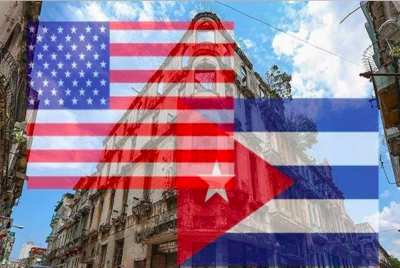US and Cuban Embassies Open for Business

On January 3, 1961, Dwight Eisenhower severed relations with Cuba – two years after Fidel Castro replaced dictator Fulgencio Batista with governance serving all Cubans, not just its privileged few.
Two months later, Kennedy’s failed Bay of Pigs invasion followed. He refused another. US relations with Cuba remained frozen until Obama began talks two years ago to change things.
On Monday, the Havana Times published Democracy Now’s report on restoring diplomatic ties, saying:
“History is being made in Washington today when Cuba raises its flag and officially reopens its US Embassy after 54 years.”
“Hundreds are gathering for this historic moment, including US and Cuban lawmakers and diplomats, activists and artists, scholars and historians.”
Cuban Foreign Minister Bruno Roriquez is in Washington along with chief negotiator Josefina Vidal and former parliament President Ricardo Alarcon.
Cuba’s flag flew in Washington for the first time in over 54 years. America’s embassy opened for business in Havana. A State Department official said “on July 20, both Interests Sections (became) embassies.”
“(A)greement between United States and Switzerland and another agreement between Cuba and Switzerland will be terminated as a result of the upgrade.”
John Kerry will visit later this summer for a formal inauguration ceremony. An ambassadorial appointment will take time if Republicans keep blocking nominees. Lower-level personnel will handle diplomatic relations.
Interest Sections head Jeffrey DeLaurentis will serve as Charge d’Affairs after formal inauguration ceremonies later this summer.
Last week, Cuban President Raul Castro called on Obama to end Washington’s embargo entirely by executive order – “to dismantle aspects of this policy that damaged and caused hardships to our people.”
Congressional Republicans refuse. They denounced removing Cuba from the State Department’s state sponsors of terrorism list. They vowed to block any ambassadorial nominee.
Longstanding US Cuba policy remains unchanged – replacing its sovereign government with one it controls. Decades of attempts failed – a testimony to Fidel Castro’s remarkable leadership, resilience and determination not to let dark forces in Washington undermine revolutionary change.
His brother succeeded him as president in February 2008 – over a year-and-a-half after his near-fatal illness.
In August he’ll be 89 – appearing at times in public, writing occasional articles and reflections to share important thoughts and ideas with readers. He remains the world’s leading elder statesman, an inspiration to millions worldwide.
Aside from reestablishing formal diplomatic ties, nothing else so far changed. Economic blockade remains official US policy. So does destabilization and plans to return Cuba to its bad old days.
Last week, Foreign Ministry deputy director for US affairs Gustavo Machin said Washington’s plans may still call for regime change despite Obama claiming otherwise. He says one thing and intends another.
“We haven’t seen anything suggesting practical change” in US/Cuban relations, Machin explained – rhetoric alone without followthrough.
The State Department’s 2016 budget includes $20 million for so-called Cuban democracy promotion programs. Their goal is undermining socialist governance – replacing it with US controlled rapacious capitalism, what Castro’s revolution succeeded in eliminating.
Reestablishing diplomatic ties has nothing to do with normalization – everything to do with giving US monied interests another market to exploit, Cuban people along with it.
Fidel Castro and other Cuban officials don’t trust Washington for good reason. Nor should anyone. Diplomatic relations come with a big price.
It includes subversion masquerading as diplomacy, attempts to control Cuba’s economy, wanting it strip-mined for profit, its people exploited like serfs, Washington’s embassy little more than a den of CIA spies and other imperial interests, in return for nothing benefitting Cuba.
As long as Republicans and anti-Cuban Democrats control Congress, expect decades of economic blockade and overall hostile relations to continue.
America’s repressive presence in Guantanamo alone is a thumb in the eye to Cuban sovereignty. Washington’s foothold on its territory gives it a chance to grab it all – a possible successful Bay of Pigs 2.0 without firing a shot.
Stephen Lendman lives in Chicago. He can be reached at [email protected].
His new book as editor and contributor is titled “Flashpoint in Ukraine: US Drive for Hegemony Risks WW III.”
http://www.claritypress.com/LendmanIII.html
Visit his blog site at sjlendman.blogspot.com.
Listen to cutting-edge discussions with distinguished guests on the Progressive Radio News Hour on the Progressive Radio Network.
It airs three times weekly: live on Sundays at 1PM Central time plus two prerecorded archived programs.

